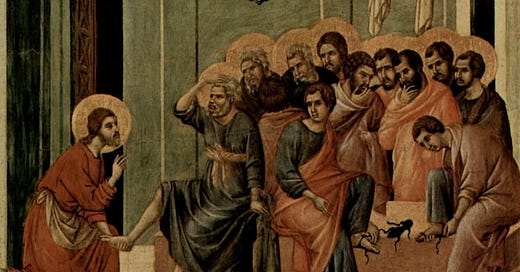Duccio di Buoninsegna The Washing of Feet (1308 – 11)
I was twenty-six when I first stood at the communion table on Maundy Thursday. Young, earnest, hopeful. My heart wore no armor yet, and ministry felt beautifully sacred—open, tender ground. Love seemed clear, safe, uncomplicated.
I wasn’t ready.
I wonder if any pastor truly is.
To shepherd—to pastor—is to open your heart wide enough for joy and pain to flow freely.
It is to hold trust in your hands knowing fully the risk it carries. And it is to choose, again and again, vulnerability over caution.
Early on, I remember receiving my first sharp critique as a young pastor.
An email.
It felt more like a weapon.
Carefully crafted, precise in its aim, cutting swiftly through every protective layer I thought I had. It wasn’t simply criticism of an idea or approach; it felt deeply personal, questioning motives and character in a way that stung far more than I expected.
I sat quietly at my desk, heart racing, rereading every word. The ache I felt wasn’t born from pride but from genuine confusion, from disappointment, from the fragile vulnerability of having loved and trusted so openly. I learned quickly—words matter deeply in pastoral ministry. Love exposes us, makes us tender and sensitive, precisely because it is real.
Every pastor knows this quiet, hidden pain. It comes in subtle forms: the gentle departure of people we cared for, misunderstandings unresolved, relationships that quietly fade away. It comes in sharp forms: critiques that catch us off guard, words that question our identity, emails that sting far longer than the sender might realize.
It’s easy to believe ministry would be simpler if we built higher walls, thicker skin, more cautious boundaries. Sometimes love feels foolish, naïve, reckless—like opening your hands willingly, exposing your heart, and quietly whispering, "I trust you," knowing full well the risk involved.
And yet each Maundy Thursday, Jesus kneels again at a basin.
He kneels, fully aware of what love will cost him. Fully aware of Judas’ betrayal, Peter’s denial, the others scattering into the darkness. Jesus knew the sting. He felt it. Deeply. And yet, without hesitation, without regret, he chose love anyway.
The mandatum of Maundy Thursday is beautiful and brutal, both invitation and challenge:
"Love one another. As I have loved you."
Not a suggestion. Not a recommendation. But a radical, costly, holy commandment. Jesus’ love was not weak or naïve; it was fiercely courageous, because he knew precisely the cost—and still chose it.
Perhaps this is our greatest pastoral task: to kneel again, basin in hand, hearts open, fully knowing love’s cost, yet choosing it anyway.
To choose vulnerability even when it hurts, to choose forgiveness even when bitterness feels justified, to choose humility when pride seems safer. To trust again, even after trust has been tested.
Because the truth is, the wounds we carry are not signs of weakness; they are evidence that we have loved authentically, courageously, like Jesus.
Tonight, pastors, we come once more to this table—bread and wine, basin and towel—not because we've forgotten how love can sting, but because we know, deeply, that the sting is worth the risk. We return year after year, not in naiveté but in deliberate vulnerability, choosing again to love anyway.
Because when we choose love in spite of the risk, we most closely resemble the One who loved us first.
Tonight, let your heart be open again. Allow your sensitivity—once viewed perhaps as weakness—to be redeemed as strength. Lean into the tenderness that once felt dangerous and recognize it as the sacred ground where Christ meets you most intimately.
And perhaps tonight, in quiet candlelight, you'll sense again the gentle touch of Jesus washing your own weary feet, reminding you gently that he knew the sting of love, too. He felt every bit of its cost. Yet without regret, he knelt low and loved anyway.
Tonight, pastors, remember your mandatum:
Love courageously.
Love vulnerably.
Love anyway.
Because love, even with its sting, is still our greatest testimony.




Tara Beth you speak to my heart. I too have been deeply hurt in ministry, more times than I would like to admit. But I am called, over and over again, to love one another. Thank-you for being you. Peace.
Amen